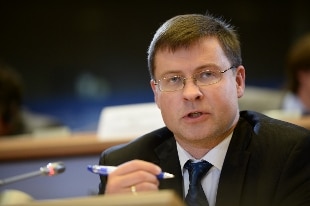Share
May 15, 2018 "I cannot anticipate the country-specific recommendations that will be published later; but if we look at the previous recommendations and the challenges Italy faces, they will still focus on budgetary issues, on the deficit reduction and on the start of public debt on a reduction path ". This was said in Brussels by the vice president of the European Commission responsible for the Euro, Valdis Dombrovskis, answering some questions during an event organized by Politico, the international newspaper specialized in European affairs."The European Commission - pointed out Dombrovskis - is not involved in the process of forming the new government in Italy"; taking it forward, he noted, "is to Italy and to the president of the Republic Mattarella, who is leading the process". However, he added, "we are ready to work with a democratically elected government for any Member State".
"Italy, after Greece - recalled the vice president of the Commission - has the second public debt of the EU, more than 130% of the GDP. It is very clear that in the current moment of economic growth Italy must put the debt public on a reduction trajectory: this is the Commission's approach and its recommendation regardless of which government will be concretely in operation, and it is also - said Dombrovkis - the approach of President Mattarella, who emphasized the need to respect the European rules throughout the course of negotiations for the formation of the new government ".
Italy must also "tackle the problem of slow increase in productivity, productivity bottlenecks in the framework in which companies operate (business environment, ed), in investments and in other areas. And then in the financial sector the reduction of non-performing loans Npl ('non-performing loans', ed.). In this - acknowledged the vice president of the Commission - it must be said that Italy has made substantial progress in the last two years ".
To a question about the reaction of the markets, which remained surprisingly calm in recent months despite political uncertainty in Italy, Dombrovskis replied: "It is clear, however, that the approach to the formation of a new government and to financial stability must remain on the current path of gradual reduction of the budget deficit and public debt ".
With regard to the absence of an Italian government with full powers just as there is discussion of a possible in-depth reform of the Eurozone, the Vice-President of the Commission noted: "I must say that Italy, the current government in current affairs, is he was indeed very active and he supported the work on the deepening of the EMU (Economic and Monetary Union, ed.) very much. I do not expect sudden changes. In any case - he concluded - the agreement of the leaders is to reach concrete decisions on 'Uem at the June summit, and we are working on this at the Commission. "

